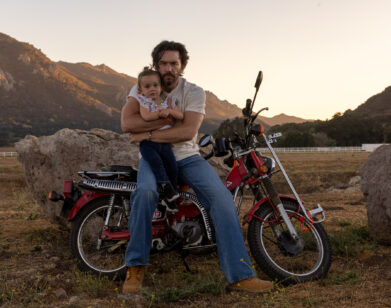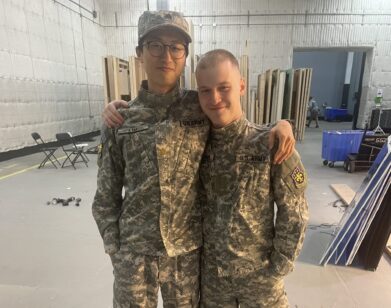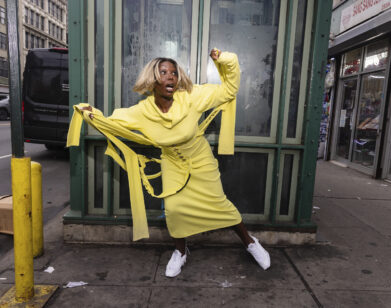DIRECTOR
James Gray and Matt Reeves on the Narcissistic Art of Filmmaking
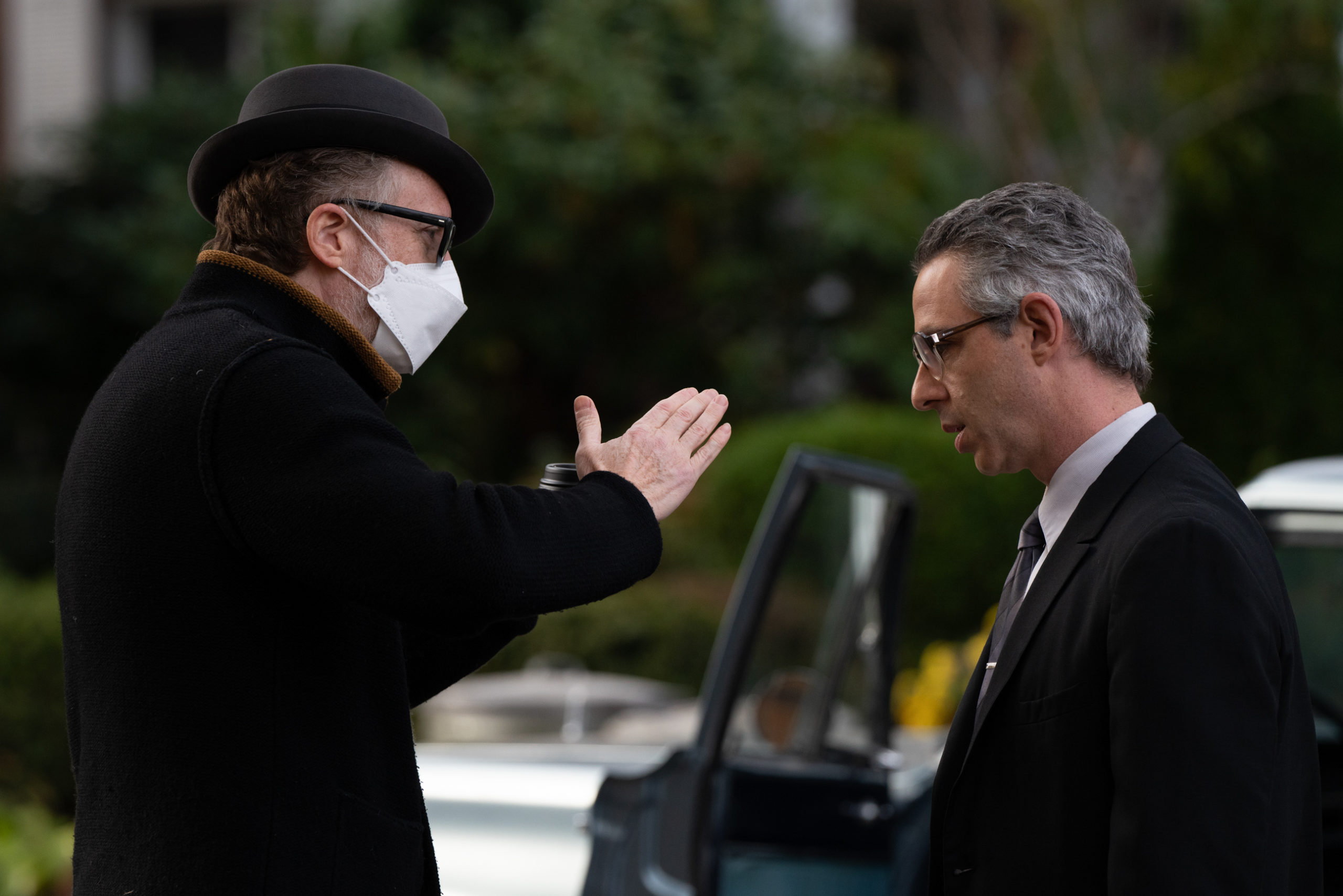
(L to R) Director James Gray and actor Jeremy Strong on the set of ARMAGEDDON TIME, a Focus Features release. Credit: Anne Joyce / Focus Features
James Gray is a master in delving into the intricacies of human behavior. Not shy to probe the personal, his first film Little Odessa (which he wrote and directed at 23), explores the seedy underworld of organized crime in Brighton Beach, Brooklyn, and drew inspiration from the dynamics of Gray’s own Russian-Jewish family and his upbringing in Flushing, Queens. His oeuvre spans the tender romantic drama Two Lovers to the Brad Pitt-led space opera Ad Astra. But despite the accolades and all-star casts, all of Gray’s films remain rooted in a rare kind of specificity. Now Gray is poised for the world to see what is perhaps his most intimate project yet: Armageddon Time. The film, which stars Anne Hathaway and Jeremy Strong alongside newcomers Banks Repeta and Jaylin Webb, is a semi-autobiographical excavation of Gray’s childhood that exuberantly collides the personal and political. Gray sets this gripping Bildungsroman to the backdrop of ‘80s America, with the country lurching towards Reaganism, a setting that feels unsettlingly relevant to our current political climate—even if you ignore the fact that the children at its center are sent to the private Kew-Forest School, at the time a so-called “haven for bigots,” which counts Donald Trump as an alum and his late father (who makes an appearance in the film) as a board member. Ahead of the release of Armageddon Time, Gray called up his longtime friend, The Batman director and screenwriter Matt Reeves, for a deep chat about the power of digging up the past. —CAITLIN LENT
———
REEVES: How are you doing?
GRAY: I’m alright. We’re supposed to talk about filmmaking.
REEVES: We can talk about filmmaking, but we’re going to talk about your movie Armageddon Time. I know the movie is so personal to you for obvious reasons. All your work is personal, that’s who you are as a filmmaker, but it’s weirdly personal for me, not because I had anything to do with it, but because I’ve known you since you were 18. When I was watching the movie again with you at the DGA [Directors Guild of America], and there’s that scene where the family is together, I had this weird experience where I was like, “Well, gee, I feel like I’ve had that dinner.” When you and I were doing The Yards, you were like, “Matt, I need you to come to my Seder dinner with my dad.”
GRAY: The amount of patience you had, and the admirable willingness to suffer, was something. You really went through it, but you didn’t have a real window into it. If you had come to that dinner when I was 12, you would’ve been more entertained. Once my mother died and my father remarried and brought in her family, it took on a very different temperature.
REEVES: And your grandfather was a recurring presence in your home.
GRAY: Yes. Obviously, you want to be a good parent. You try to do the best that you can and you’re invariably going to make a ton of mistakes, but the most important thing you communicate as a parent is, “Is the kid wanted and loved?” You can make a ton of other mistakes. As long as that’s clear, the kid will probably be alright. My parents didn’t really do that, but my grandfather did.
REEVES: Right.
GRAY: My grandfather took the time to say that we mattered. My parents were too caught up with the panic of trying to put food on the table, which was very difficult in the late ‘70s. They had financial trouble and it got quite dire at some points, more so than depicted in the movie. And many times, my father would take it out on us, and me in particular, but my grandfather had none of that. He was the guy who encouraged us to do what we wanted and clearly loved us without judgment. I’m sure you’ve had at least one person in your life like that.
REEVES: Well, my parents’ marriage was very volatile. You always talk about family and the idea about how the family is the place of the most intimate nurturing, but also the most strongest form of violence. That was the thing within my family. My dad always wanted to be a filmmaker, so when I became interested in movies, he was very encouraging, but they would have really dramatic fights, and I remember thinking that the world was going to fly apart, so filmmaking was a place to retreat to. But my father introduced me to a lot of movies, like The Godfather, The French Connection, Carnal Knowledge. If my mother knew at the time what I was watching, it would’ve been a crisis.
GRAY: Wait a minute. How old were you with Carnal Knowledge?
REEVES: I probably was about 13.
GRAY: [Laughs] Perfect.
REEVES: It was perfect. My father really supported the idea of filmmaking because he loved movies, and my mother was the kind of person that if I would do a magic trick, she’d be like, “That’s the greatest thing I’ve ever seen.” And so, she’d support me just through unconditional love of everything that I was doing. She thought it was a miracle that I could make a movie, that I knew how to turn the camera on. So, they were both supportive in different ways. That was important in my development, but the energy between them was really scary. But, I have to say that knowing your dad who has since passed away and seeing Jeremy [Strong] in the role, it struck me, because he’s very much your dad. He’s not, but he is.
GRAY: Oh, he’s doing it.
REEVES: He really has captured something so vivid about him. Before I ever met your father, you had done incredible impressions of him because you’re such an amazing mimic. And then I met him and I was like, “Oh, he does talk like that.” Can you talk about what that process was, for you to introduce Jeremy to who your father was and how you guys worked together on that performance?
GRAY: I tried to put as much detail into the script as I could, but I didn’t want him to do an imitation of my dad. I was very resistant to that.
REEVES: Sure.
GRAY: I showed him some pictures, but I said, “I want you to do your own thing. As much as you need to know about my father, it’s in the screenplay.”
REEVES: Was your father still alive at the time you began the screenplay?
GRAY: Yeah. My father died, as you know—well, maybe you don’t remember. You were in the middle of your own maelstrom. In fact, I believe he died right as The Batman was coming out.
REEVES: Yes, that makes sense. I remember you telling me.
GRAY: It was about two months after we finished shooting. He died of COVID. I recorded him doing the Proust questionnaire at Jeremy’s request. Jeremy asked me to do it, as my dad, first. In other words, he asked me the Proust questionnaire questions, and then I would, with my dad’s voice, answer as I thought my father would. And then my wife, Allie [Dickson Gray], and my kids, videoed my father doing it at a restaurant. And his answers lined up very, very closely with what I predicted he would say. In some ways, that helped Jeremy more than anything else, because he knew that he could rely on me to give him the answer of what my father would have done in any given circumstance. He would say, “What did he eat?” “Oh, Ba-Tampte pickles. He loved those.” Next thing I know, the props department has a ton of Ba-Tampte pickles in the refrigerator at the production office. “What did he wear?” “This cap, these glasses.” I remember when he showed up on set and managed to pad his ass a little bit, I don’t know how he knew to do that. I don’t think I showed him pictures like that. And the way he stood with a slight bow-leg, I said, “How did you know that?” Because my father had rickets when he was a very young boy, a Depression-era kind of illness. He said, “I don’t know. I just felt it.” As you know, I went off to Paris to do The Marriage of Figaro. I’ve never done an opera before. And you were good enough to come, which deeply moved me.
REEVES: Yeah, that was right before—
GRAY: The world ended.
REEVES: Yeah.
GRAY: It was a very informative experience for me, because you realize Mozart and da Ponte wrote that opera at the end of the 18th century, and it’s been performed five bajillion times. So if you’re hired to direct that opera, you could either say, “I’m going to do Marriage of Figaro inside the New York subway system, or Marriage of Figaro reimagined with space aliens,” which is obnoxious. Or, you could honor Mozart and da Ponte. And if you do, and if it’s been done so many times, what is the difference? What can you bring to it? The answer is detail, and an obsession with the specifics of human behavior. The answer is the Ba-Tampte pickles, the Sears Roebuck catalog clothes that Annie [Hathaway] wears, the tinted glasses that my grandmother used to have that were quite large, the hamster put in the plastic ball. All those things that seem to be extraneous, actually become of crucial importance.
REEVES: You’re going at something very universal by being really specific.
GRAY: Exactly. Not to get too sentimental, but I read something on the wall of an art exhibit I went to about six or seven years ago. It said, “History and myth begin in the microcosm of the personal.” The idea there is crucial. Today, if something is a myth it can also mean it’s a lie. But we can also mean when something is mythic, that’s a very different meaning. And that is achieved in a very general way only through an obsession with specifics. Artistically it’s a paradox, but I think it’s true.
REEVES: I’ve done things that seem, in many ways, not personal. But the only way I can ever approach what I do is to try and attune my compass to a personal place. Something about this movie that really strikes me is it actually takes it a step further into the autobiographical, which is to say, you constructed a story of it. You took the elements of your life in order to create a story, so in that sense, it’s not your life, but it is made up of details that happened to you.
GRAY: That’s true. Let’s stipulate this, if we may. Personal and autobiographical are not the same thing. You can make an incredibly personal film called The Batman, and you can make a movie that has absolutely no personal commitment at all, but recounts your family with accuracy. This is why genre was looked down upon by American film critics in the 1950s. It took the French to understand that the American usage of genre took on, at times, a tremendously personal impact. It’s why Truffaut needed to discover Hitchcock for us. The great leap in the ‘60s that Truffaut helped make with his book Hitchcock/Truffaut was the understanding that the personal involved a kind of emotional commitment that was direct and clear from the spirit and soul of the artists, and that’s what mattered.
REEVES: Of course. I think of [Gray’s first film] Little Odessa.
GRAY: Yeah.
REEVES: It’s a crime story, so it’s a genre story, but it’s a very personal story to you. There are moments in it that have that level of specificity.
GRAY: That’s right.
REEVES: I remember very clearly you invited me to the screening of the first cut, which I know we’ve talked about many times and how it was a horror for you, but for me, I remember having this feeling of having witnessed something so intensely personal.
GRAY: That’s certainly true. There’s almost a natural wall that exists between the artist and the subject or the work. The question really is, how effectively can you break down that wall? How effectively can you start to communicate directly with your emotions, with your internal life? For me, it’s not what I look for in, dare I use this dirty word, art. And I’ve quoted this many times to the point of nausea, but I keep going back to it. There’s a George Elliot quote which is, “The thing we owe the artist is the extension of our sympathies.” That idea has not always been in vogue.
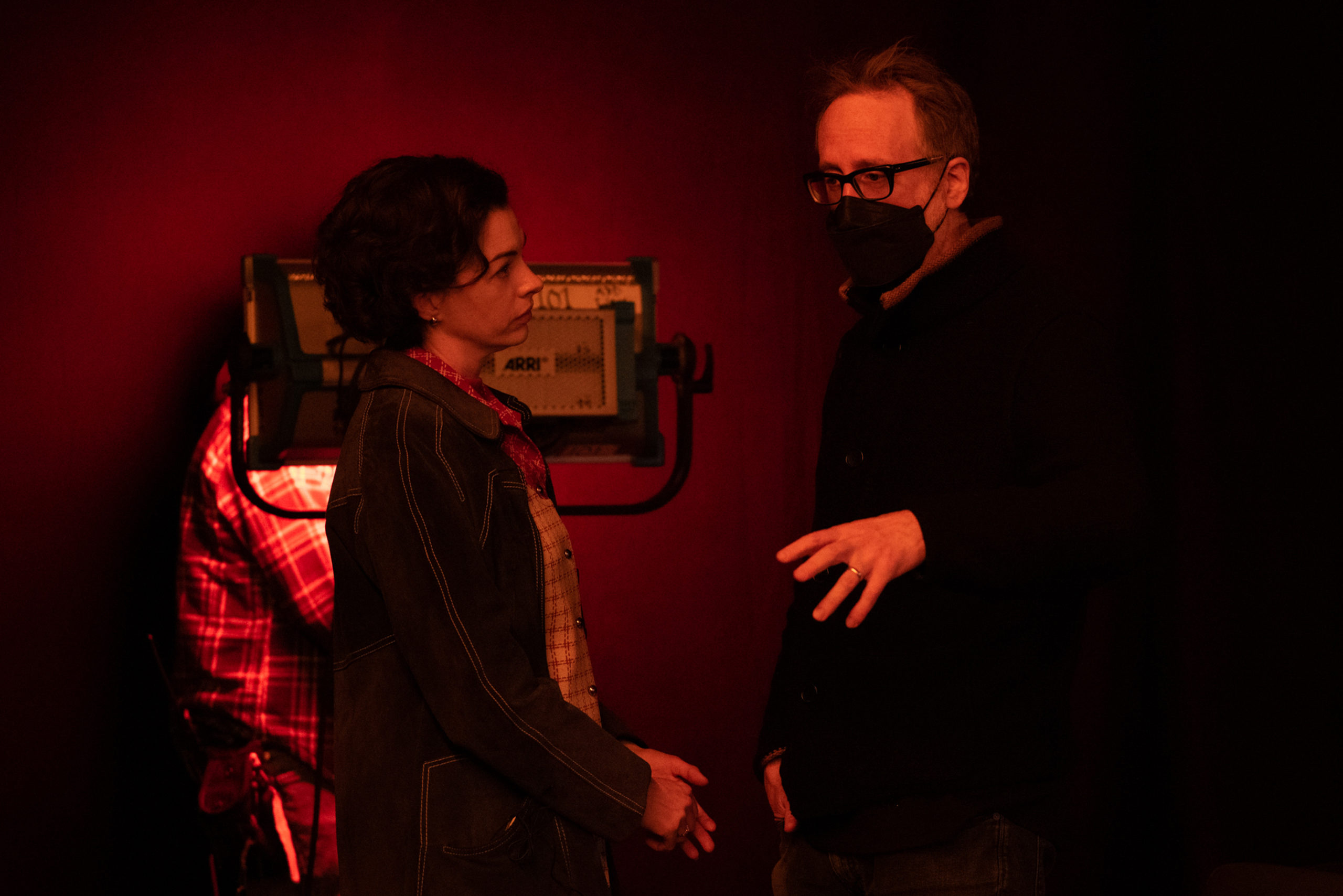
(L to R) Actor Anne Hathaway and director James Gray on the set of ARMAGEDDON TIME, a Focus Features release. Credit: Anne Joyce / Focus Features
REEVES: What I love about you as a filmmaker is that you’ve always worked from that mode, and it doesn’t look like it has anything to do with what’s in vogue. It’s just all about the experience of being human.
GRAY: That’s the reason that we experience art, to look into the soul of others and to find that element of compassion. Not to sneer, not to act like we’re smarter, bigger, fancier. We’re not better. So to me, any other pursuit is an act of folly, because it becomes a perverse kind of narcissism. Now look, we have to be narcissists to make a film. To me, the toughest part of direction in some sense is you have to be a narcissist. I have to say to myself that my relationship with my mother and father, and my relationship with my friend and public school and all that was so important that someone can spend 16 million dollars on it, and I can spend a year on it, and all these great actors are going to come help me, and it’s going to play, and everybody’s got to come see it. That’s an act of narcissism. That’s psychotic. But once you’re starting the project, you have to forget that.
REEVES: Yeah. That’s not entirely it, but that’s a huge component. You and I began making movies at a time following the ‘70s where movies were incredibly personal but also examining genre in a way that was really embracing a kind of European aesthetic.
GRAY: Absolutely.
REEVES: I would say that now, movies are as far away from that as they’ve ever been in our lifetimes, and yet you continue to persist in a way that I totally admire.
GRAY: I appreciate that, but what I would say is that no work exists outside of time and fashion even if you’re working against it. I’m sure you feel the same way. It’s not our job to do what’s in vogue because our movies are not made and released the same day. You have to, in a sense, predict the future, which is an act of folly.
REEVES: Yes.
GRAY: No human can do that. So the only thing you can do is stay true to yourself and hope for the best. Maybe Kubrick thought “I’m being hip” when he made 2001: A Space Odyssey. But I look at him, for example, he started that in 1964, and there was no way he could have predicted the explosion of the drug culture and the hippie culture and the fact that they could then market the film as the ultimate trip. Not that his brilliance or genius is luck, but that is luck.
REEVES: Of course. Timing is luck. This is interesting to me: In terms of the way the world is right now, and in Armageddon Time, your reason for being drawn to make it aside from obviously how personal it is, I think is about the the polarization of different aspects of the world, and the way in which social media and the internet has made people’s so siloed. This idea that we’re talking about cinema being all about empathy and having a kind of understanding—we seem to be at a very heightened moment of a lack of empathy for each other. There’s something interesting to me when I think about your movie, about you choosing to do this story at this time.
GRAY: I’m not on Twitter. My daughter is, my wife is, and there are many brilliant things that they will show me that people will tweet out or whatever, people can do. It’s a skill.
REEVES: Sure. But they’re also mostly talking to people who agree with them.
GRAY: And the other problem is that it’s especially harmful, at least in my experience, for art, because you could essentially boil down anything to a snide joke, like, “Oh great, yet another movie that glorifies criminals.” And you could be talking about The Godfather. In other words, you can say something snide and politically reductionist about anything. So there, we come back to this idea of the detail. I really believe this is what has given rise to a certain new type of lazy criticism, because when you can just cast things aside without focusing on the nuance, dare I use that word, or details, then everything becomes reducible to a one-liner. And then, there really is no point in making a work of art. Can you imagine Jackson Pollock in the age of Twitter? “Oh, some guy just threw paint on the wall.”
REEVES: “A bunch of dots and splashes.”
GRAY: I don’t know if it would survive Twitter. You need to see it in person. You need to understand the context of where it is, what he’s saying about the world. All these things do matter.
REEVES: I guess what I’m saying is I don’t know if we survive with not just Twitter, but this idea of the polarization where we don’t see each other. The goal of your movie is that same idea of having a level of empathy for characters and the struggle for humanity to be able to see each other in different ways. And so, why did you choose now? Because you’ve always done personal work. That’s the way you approach your work. But what do you think made you want to do that right now?
GRAY: Well, I can answer that very obviously, on a surface level. It’s that the country’s under real threat. We face a real struggle. So I felt even then in 2019 when I wrote it, like exposing a kind of idea, not just of white privilege but the march towards autocracy. There’s a thread in the movie which says, “No, no. Something is wrong here, deeply wrong. And these people aren’t paying attention, and they’re going to pay.” And I feel the same thing now, and I hope I’m dead wrong.




